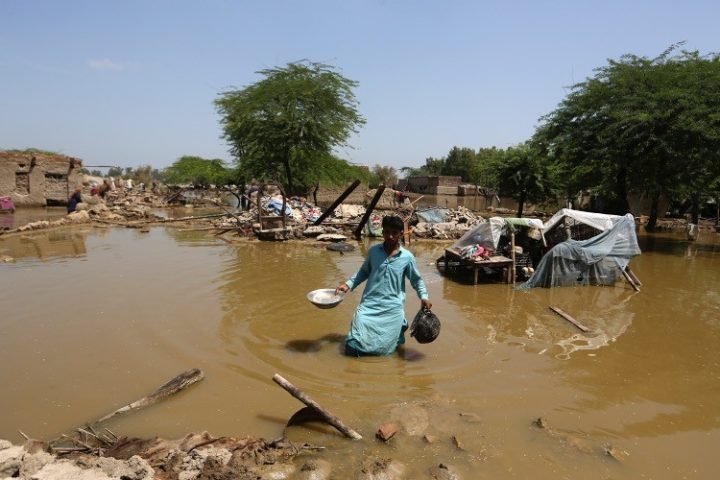
Pakistan’s climate minister, along with the United Nations, is claiming that developed nations such as the United States should be paying Pakistan reparations for harmful flooding in the country this year. The Islamic nation, which is bordered by India and Afghanistan, is subject to monsoons, and the current one has been especially destructive, causing widespread flooding.
Close to 1,300 people have been killed in the nation during this monsoon and, according to Sherry Rehman, the nation’s climate minister, it’s all the fault of the developed nations of the world and their nefarious use of fossil fuels.
“Global warming is the existential crisis facing the world and Pakistan is ground zero — yet we have contributed less than 1% to [greenhouse gas] emissions. We all know that the pledges made in multilateral forums have not been fulfilled,” Rehman, a former ambassador to the United States, told The Guardian.
Rehman called for a “reset” of the emissions targets reached with the Paris climate agreement.
“There is so much loss and damage with so little reparations to countries that contributed so little to the world’s carbon footprint that obviously the bargain made between the global north and global south is not working. We need to be pressing very hard for a reset of the targets because climate change is accelerating much faster than predicted, on the ground, that is very clear.”
Pakistan’s Sindh Province, an area roughly the size of Colorado, has been affected with severe flooding, which has reportedly ruined 90 percent of the crops in the province, which produces roughly half of the nation’s food. Approximately 160 bridges have been destroyed or washed out by the monsoon rains.
According to Rehman, the fact that Pakistan is located in an area where monsoons are a common occurrence has nothing whatsoever to do with the country’s current woes. In her mind, the flooding is clearly the result of man-made global warming.
“The whole area looks like an ocean with no horizon — nothing like this has been seen before,” Rehman said. “I wince when I hear people say these are natural disasters. This is very much the age of the anthropocene: these are man-made disasters.”
UN Secretary-General António Guterres, a well-known climate crusader, echoed Rehman’s lamentations over the flooding.
“The Pakistani people are facing a monsoon on steroids — the relentless impact of epochal levels of rain and flooding,” Guterres said in an August 30 speech. “This climate catastrophe has killed more than 1,000 people with many more injured.”
Guterres laid that groundwork before insisting that the world pay Pakistan for the monsoon flooding.
“In response to the devastation, the Government of Pakistan has released funds, including immediate cash relief. But the scale of needs is rising like the flood waters. It requires the world’s collective and prioritized attention,” the secretary-general explained.
“The United Nations is issuing a Flash Appeal for $160 million to support the response, led by the Government of Pakistan. These funds will provide 5.2 million people with food, water, sanitation, emergency education, protection and health support.”
Despite an Atlantic hurricane season that is bordering on nonexistent this year, Guterres repeated the lie that extreme weather events are increasing due to global warming.
“As we continue to see more and more extreme weather events around the world, it is outrageous that climate action is being put on the back burner as global emissions of greenhouse gasses are still rising, putting all of us — everywhere — in growing danger,” Guterres said.
Rehman called on the world to do even more, despite the fact that much of the globe is still facing economic disruptions caused by government responses to Covid-19 and Western economic sanctions on Russia over its invasion of Ukraine.
“Historic injustices have to be heard and there must be some level of climate equation so that the brunt of the irresponsible carbon consumption is not being laid on nations near the equator which are obviously unable to create resilient infrastructure on their own,” the climate minister stressed.
Rehman called for fossil-fuel corporations to shoulder a substantial portion of the climate reparations.
“Big polluters often try to greenwash their emissions but you can’t walk away from the reality that big corporations that have net profits bigger than the GDP of many countries need to take responsibility,” Rehman declared.
The monsoon in Pakistan has been bad — possibly even a record for rainfall in the nation. But there have been other terrible monsoon seasons in the nation, among them 2014, 2011, 2001, 1992, 1972, 1962, and 1953. Why, all of a sudden, is this season solely the fault of greenhouse gas emissions?
Sending millions of dollars to a South Asian nation because we admitted some sort of responsibility for the weather would be a ridiculous and dangerous precedent to set.





